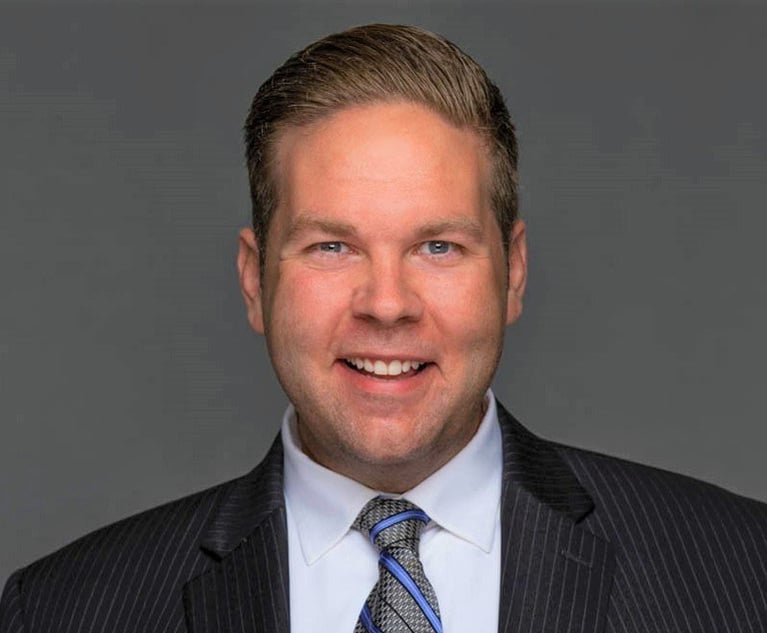For-Profit Delco Prison Settles Inmate Suicide Lawsuit for $7M
A privately-owned Delaware County prison has agreed to pay $7 million to the family of a mentally ill inmate who was allegedly mistreated by staff, denied psychiatric treatment and encouraged to kill herself by a guard.
November 09, 2017 at 06:17 PM
6 minute read

A privately-owned Delaware County prison has agreed to pay $7 million to the family of a mentally ill inmate who was allegedly mistreated by staff, denied psychiatric treatment and encouraged to kill herself by a guard.
Additionally, the prior owner of the George W. Hill Correctional Facility, Community Education Centers Inc., agreed to implement policy reforms in its facilities geared toward preventing future suicides.
Janene Wallace, 35, who suffered from depression, anxiety and paranoia, committed suicide on May 26, 2015, during a 52-day period in solitary confinement. Wallace committed suicide by hanging herself from a ventilation grate with her bra. She had been incarcerated for violating probation for a conviction of making terroristic threats against another woman over the phone, according to court papers.
Kline & Specter attorney David Inscho represented Susanne Wallace, Janene Wallace's mother, in the case.
“This is a significant recovery against a private company operating the Delaware County jail. A private prison company, even though it performs a government function, was not entitled to immunity and could be held responsible under the common law of the commonwealth,” Inscho said in an email, adding that the settlement was also significant because the policy changes the company agreed to will prevent mentally ill people from being held in solitary confinement and inmates from being placed in restricted housing units without proper monitoring. “This will hopefully prevent similar tragedies going forward.”
DiOrio & Sereni in Media represented the defendants. In a statement issued by the firm, it said the case highlights the challenges of mentally-ill inmates.
“Although the circumstances involving Ms. Wallace occurred during the term of the
previous provider, CEC, the Prison Board and the current provider, GEO, will continue their
efforts to reevaluate relevant prison policies and procedures. Since it began the process of its transition, GEO has initiated a review and revision of existing policy and procedure concerning inmate confinement, including medical assessment and intervention,” the statement read
The plaintiff claimed Janene Wallace was denied daily medical checks and essentials such as blankets, sheets and towels. Her mother also claimed in court papers that a guard told her to “go ahead and choke herself” after she threatened to commit suicide.
However, according to the defendants' papers, “Ms. Wallace refused any medical or mental health treatment while at the prison, which appears consistent with her behavior outside of prison where plaintiff has testified that her daughter refused treatment, and specifically, mental health treatment, in the years before her incarceration.”
The defendants also implied that Susanne Wallace could not stand to live with her daughter.
“Plaintiff Susanne Wallace had to move into a different house in the year after [Janene] Wallace's incarceration in 2013 because, according to her husband Howard Wallace, he was not going to 'make my daughter homeless and not giver her a place to live,' clearly implying that plaintiff would not live in the same house as her daughter Janene Wallace.”

A privately-owned Delaware County prison has agreed to pay $7 million to the family of a mentally ill inmate who was allegedly mistreated by staff, denied psychiatric treatment and encouraged to kill herself by a guard.
Additionally, the prior owner of the George W. Hill Correctional Facility, Community Education Centers Inc., agreed to implement policy reforms in its facilities geared toward preventing future suicides.
Janene Wallace, 35, who suffered from depression, anxiety and paranoia, committed suicide on May 26, 2015, during a 52-day period in solitary confinement. Wallace committed suicide by hanging herself from a ventilation grate with her bra. She had been incarcerated for violating probation for a conviction of making terroristic threats against another woman over the phone, according to court papers.
“This is a significant recovery against a private company operating the Delaware County jail. A private prison company, even though it performs a government function, was not entitled to immunity and could be held responsible under the common law of the commonwealth,” Inscho said in an email, adding that the settlement was also significant because the policy changes the company agreed to will prevent mentally ill people from being held in solitary confinement and inmates from being placed in restricted housing units without proper monitoring. “This will hopefully prevent similar tragedies going forward.”
DiOrio & Sereni in Media represented the defendants. In a statement issued by the firm, it said the case highlights the challenges of mentally-ill inmates.
“Although the circumstances involving Ms. Wallace occurred during the term of the
previous provider, CEC, the Prison Board and the current provider, GEO, will continue their
efforts to reevaluate relevant prison policies and procedures. Since it began the process of its transition, GEO has initiated a review and revision of existing policy and procedure concerning inmate confinement, including medical assessment and intervention,” the statement read
The plaintiff claimed Janene Wallace was denied daily medical checks and essentials such as blankets, sheets and towels. Her mother also claimed in court papers that a guard told her to “go ahead and choke herself” after she threatened to commit suicide.
However, according to the defendants' papers, “Ms. Wallace refused any medical or mental health treatment while at the prison, which appears consistent with her behavior outside of prison where plaintiff has testified that her daughter refused treatment, and specifically, mental health treatment, in the years before her incarceration.”
The defendants also implied that Susanne Wallace could not stand to live with her daughter.
“Plaintiff Susanne Wallace had to move into a different house in the year after [Janene] Wallace's incarceration in 2013 because, according to her husband Howard Wallace, he was not going to 'make my daughter homeless and not giver her a place to live,' clearly implying that plaintiff would not live in the same house as her daughter Janene Wallace.”
This content has been archived. It is available through our partners, LexisNexis® and Bloomberg Law.
To view this content, please continue to their sites.
Not a Lexis Subscriber?
Subscribe Now
Not a Bloomberg Law Subscriber?
Subscribe Now
NOT FOR REPRINT
© 2025 ALM Global, LLC, All Rights Reserved. Request academic re-use from www.copyright.com. All other uses, submit a request to [email protected]. For more information visit Asset & Logo Licensing.
You Might Like
View All
Samuel M. Lehrer, Retired Philadelphia Court of Common Pleas Judge, Dies
1 minute read

Longtime Reed Smith Health Care Partner Opts for Solo Practice Over Retirement
3 minute read
Trending Stories
- 1Restoring Trust in the Courts Starts in New York
- 2'Pull Back the Curtain': Ex-NFL Players Seek Discovery in Lawsuit Over League's Disability Plan
- 3Tensions Run High at Final Hearing Before Manhattan Congestion Pricing Takes Effect
- 4Improper Removal to Fed. Court Leads to $100K Bill for Blue Cross Blue Shield
- 5Michael Halpern, Beloved Key West Attorney, Dies at 72
Who Got The Work
Michael G. Bongiorno, Andrew Scott Dulberg and Elizabeth E. Driscoll from Wilmer Cutler Pickering Hale and Dorr have stepped in to represent Symbotic Inc., an A.I.-enabled technology platform that focuses on increasing supply chain efficiency, and other defendants in a pending shareholder derivative lawsuit. The case, filed Oct. 2 in Massachusetts District Court by the Brown Law Firm on behalf of Stephen Austen, accuses certain officers and directors of misleading investors in regard to Symbotic's potential for margin growth by failing to disclose that the company was not equipped to timely deploy its systems or manage expenses through project delays. The case, assigned to U.S. District Judge Nathaniel M. Gorton, is 1:24-cv-12522, Austen v. Cohen et al.
Who Got The Work
Edmund Polubinski and Marie Killmond of Davis Polk & Wardwell have entered appearances for data platform software development company MongoDB and other defendants in a pending shareholder derivative lawsuit. The action, filed Oct. 7 in New York Southern District Court by the Brown Law Firm, accuses the company's directors and/or officers of falsely expressing confidence in the company’s restructuring of its sales incentive plan and downplaying the severity of decreases in its upfront commitments. The case is 1:24-cv-07594, Roy v. Ittycheria et al.
Who Got The Work
Amy O. Bruchs and Kurt F. Ellison of Michael Best & Friedrich have entered appearances for Epic Systems Corp. in a pending employment discrimination lawsuit. The suit was filed Sept. 7 in Wisconsin Western District Court by Levine Eisberner LLC and Siri & Glimstad on behalf of a project manager who claims that he was wrongfully terminated after applying for a religious exemption to the defendant's COVID-19 vaccine mandate. The case, assigned to U.S. Magistrate Judge Anita Marie Boor, is 3:24-cv-00630, Secker, Nathan v. Epic Systems Corporation.
Who Got The Work
David X. Sullivan, Thomas J. Finn and Gregory A. Hall from McCarter & English have entered appearances for Sunrun Installation Services in a pending civil rights lawsuit. The complaint was filed Sept. 4 in Connecticut District Court by attorney Robert M. Berke on behalf of former employee George Edward Steins, who was arrested and charged with employing an unregistered home improvement salesperson. The complaint alleges that had Sunrun informed the Connecticut Department of Consumer Protection that the plaintiff's employment had ended in 2017 and that he no longer held Sunrun's home improvement contractor license, he would not have been hit with charges, which were dismissed in May 2024. The case, assigned to U.S. District Judge Jeffrey A. Meyer, is 3:24-cv-01423, Steins v. Sunrun, Inc. et al.
Who Got The Work
Greenberg Traurig shareholder Joshua L. Raskin has entered an appearance for boohoo.com UK Ltd. in a pending patent infringement lawsuit. The suit, filed Sept. 3 in Texas Eastern District Court by Rozier Hardt McDonough on behalf of Alto Dynamics, asserts five patents related to an online shopping platform. The case, assigned to U.S. District Judge Rodney Gilstrap, is 2:24-cv-00719, Alto Dynamics, LLC v. boohoo.com UK Limited.
Featured Firms
Law Offices of Gary Martin Hays & Associates, P.C.
(470) 294-1674
Law Offices of Mark E. Salomone
(857) 444-6468
Smith & Hassler
(713) 739-1250





